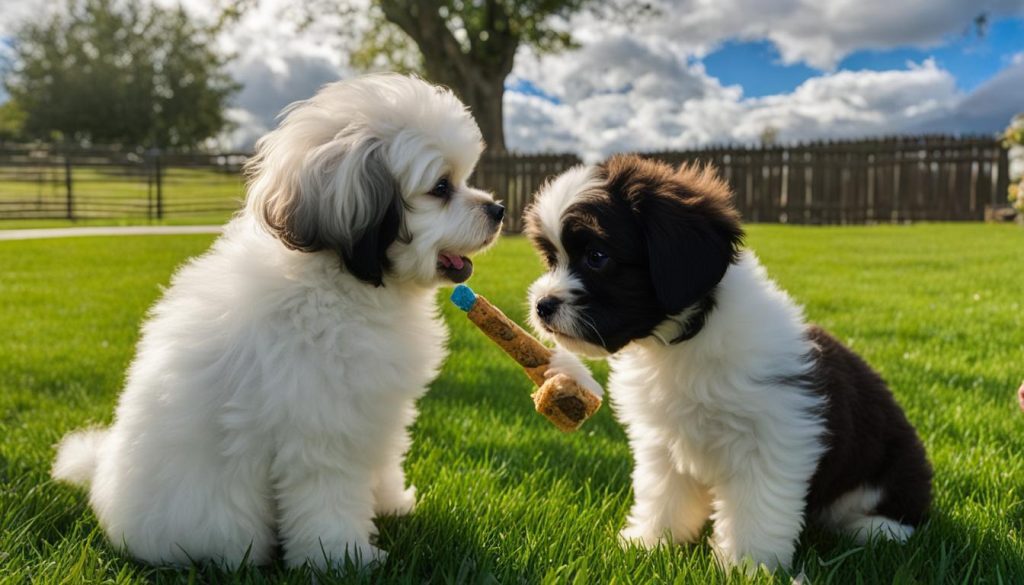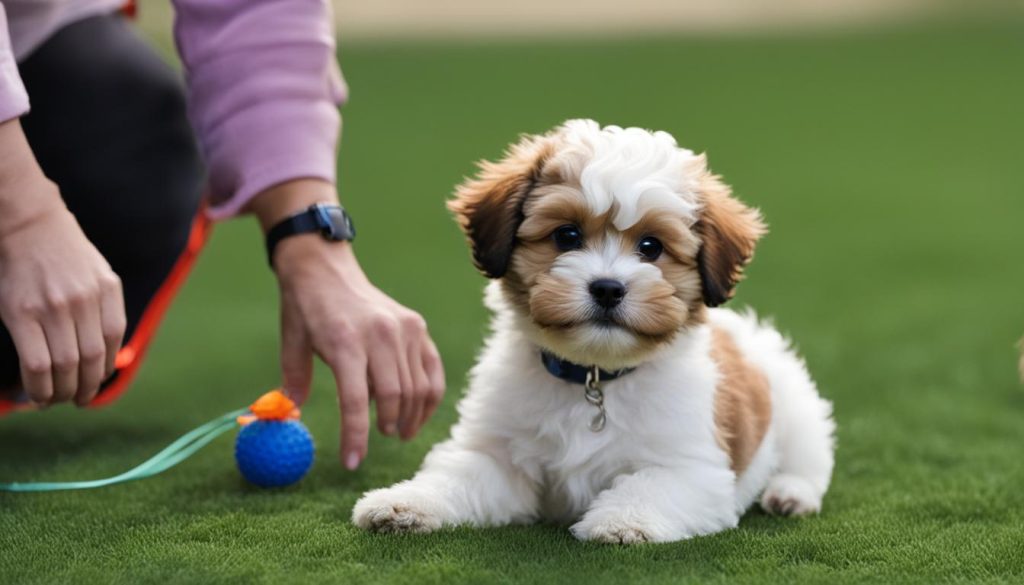Training a Shih-Poo is an important part of nurturing a well-behaved and connected dog. Whether you have a Shih-Poo puppy or an adult dog, implementing effective training techniques can make all the difference in your dog’s behavior and your bond with them.
To achieve successful Shih-Poo training, it is recommended to start early, as puppies are exceptionally receptive to learning. Their sponge-like minds absorb information quickly, making it easier to establish desired behaviors.
One key aspect of Shih-Poo training is establishing a routine and adhering to it consistently. By setting a schedule for meals, potty breaks, exercise, and bedtime, you provide structure that helps your Shih-Poo understand expectations and feel secure.
Positive reinforcement training is highly effective with Shih-Poos. By rewarding good behaviors with treats or praise, you can encourage desired actions and discourage unwanted ones. This method builds a positive association and fosters a stronger bond between you and your dog.
Utilizing crate training can also be beneficial. Crate training is not only helpful for house training, but it also provides your Shih-Poo with a safe and comfortable space. This can boost their confidence and give them a sense of security.
Mirror training is another technique worth considering. By mimicking your dog’s actions, you can create a stronger connection and build trust. This method reinforces your role as a leader and helps establish a cooperative relationship.
Equipping yourself with the right training tools is crucial. Having treats or toys as rewards can motivate your Shih-Poo during training sessions. Additionally, proper socialization is essential for a well-rounded dog, so be sure to expose your Shih-Poo to various sights, sounds, and experiences.
Regular exercise and mental stimulation are vital for the overall well-being of your Shih-Poo. Engaging in playtime and incorporating Shih-Poo training sessions into their daily routine will contribute to their happiness and good behavior.
By following these Shih-Poo training tips, you can foster a closer bond with your beloved companion and raise a well-behaved and obedient dog.
Shih-Poo Training Tips For First-Time Owners
- Start Shih-Poo training early, as puppies are highly receptive to learning.
- Establish a consistent routine to provide structure and build confidence.
- Utilize positive reinforcement training with treats and praise.
- Consider crate training for house training and creating a safe space.
- Try mirror training to strengthen the bond with your Shih-Poo.
Best Age To Start Training Your Shih Poo Puppy
When it comes to training your Shih-Poo puppy, starting early is key. Puppies are like sponges, soaking up knowledge and experiences at a faster rate than adult dogs. By initiating training at a young age, you can lay a solid foundation for their future behaviors and ensure they grow up to be well-behaved and obedient.
Responsible breeders often begin training their puppies before they are adopted. This early training covers important aspects such as socialization, potty training, crate training, and basic manners, preparing the puppies for their transition to their forever homes. However, even if your Shih-Poo was not exposed to early training, it’s never too late to start.
To successfully train your Shih-Poo puppy, establishing a routine is crucial. Consistency in mealtimes, potty breaks, exercise, and bedtime helps provide structure and builds confidence in puppies. A predictable routine allows them to anticipate their daily activities, making training more effective.
Puppies have a natural curiosity and eagerness to please their owners, making them highly receptive to learning. By taking advantage of their early age and using positive reinforcement techniques, you can shape their behaviors and instill good habits. Rewarding them with treats, praise, and playtime for displaying desired behaviors encourages them to repeat those actions.
One important aspect of training your Shih-Poo puppy is socialization. Exposing them to different people, animals, and environments helps them develop confidence and prevents them from becoming fearful or aggressive in unfamiliar situations. Gradually introduce them to new experiences, always monitoring their reactions and ensuring their safety.

Training your Shih-Poo puppy from an early age not only sets them up for success in adulthood but also strengthens the bond between you and your furry companion. By investing time and effort into their training, you can enjoy a lifetime of companionship filled with love, obedience, and mutual understanding.
Shih Poo Training Sample Routine
Having a training routine is essential for Shih-Poo training. A consistent schedule helps establish good behaviors and aids in housetraining. Here is a sample training routine for a Shih-Poo puppy:
- Potty Time: Start the day with a potty break right after waking up.
- Scheduled Mealtimes: Feed your Shih-Poo puppy at the same times every day to establish a meal schedule.
- Potty Breaks: Take your puppy outside for a potty break after meals to reinforce proper elimination habits.
- Exercise: Engage in playtime or short walks after potty breaks to provide physical activity and mental stimulation.
- Naptime: Allow your puppy to have a designated naptime in a comfortable space.
- Potty Break After Nap: Take your puppy outside for a potty break as soon as they wake up from their nap.
- Bedtime: Ensure your Shih-Poo goes to bed at the same time every day to establish a consistent sleep routine.
When planning the routine, consider your puppy’s age. Younger puppies may require smaller portions and more frequent meals. By following a structured routine, you can promote good habits and make the training process more effective.
Incorporating this Shih-Poo training routine into your daily life will help your Shih-Poo puppy thrive both mentally and physically. Consistency and patience are key to successful training. Stick to the schedule and provide positive reinforcement to foster a strong bond with your furry companion.
4 Obedience Training Methods For Your Shih Poo
When it comes to Shih-Poo obedience training, there are several effective methods you can use to ensure a well-behaved and happy dog. Each method has its advantages, and you can choose the ones that best suit your Shih-Poo’s personality and preferences.
1. Positive Reinforcement Training
Positive reinforcement training is a highly effective method that focuses on rewarding good behaviors and ignoring unwanted ones. By using treats, praise, and affection, you can motivate your Shih-Poo to repeat desirable behaviors. This positive approach nurtures a strong bond between you and your furry friend.
2. Clicker Training
Clicker training is a popular method that involves using a handheld device that emits a clicking sound. The clicker serves as a conditioned reinforcer, signaling to your Shih-Poo that they have performed the desired behavior. By associating the click with rewards like treats, you can effectively communicate with your dog and reinforce positive behaviors.
3. Crate Training
Crate training is not only useful for house training your Shih-Poo but also helps create a safe space for them. By introducing your dog to a crate and gradually increasing the time they spend inside, you can teach them to view the crate as a comfortable and secure den. This method is especially helpful for building confidence and providing a sense of security for your Shih-Poo.
4. Mirror Training
Mirror training is a unique method that strengthens the bond between you and your Shih-Poo. By mirroring your own behavior, you can encourage your dog to imitate you. This technique fosters trust and cooperation, making training sessions more engaging and enjoyable for both of you.
Remember that every Shih-Poo is unique, and a combination of these training methods may work best for your furry companion. Stay patient, consistent, and always focus on positive reinforcement to achieve the best results in your Shih-Poo training journey.

The Training Items You Absolutely Need For Your Shih Poo
While Shih-Poo training doesn’t require specific equipment, there are some essential items that can make the training process easier and more effective.
- Treats: Treats are a valuable tool in Shih-Poo training. They can be used as rewards for good behavior during training sessions, helping to reinforce positive actions and motivate your furry friend.
- Toys: Toys are not just for fun; they also play a crucial role in training. Interactive toys, such as puzzle toys or treat-dispensing toys, can keep your Shih-Poo engaged and mentally stimulated during training exercises.
- Collar: A well-fitted collar is essential for training your Shih-Poo. It provides a means to attach identification tags as well as a leash for walks and outdoor training sessions. Opt for a comfortable, adjustable collar that doesn’t cause discomfort or restrict your dog’s movement.
- Leash: A sturdy leash is a must-have for any dog owner. It allows you to maintain control during walks and outdoor training activities. Look for a leash that is both durable and comfortable to hold, ensuring your Shih-Poo’s safety and your ease of use.
Additionally, it is important to monitor your Shih-Poo’s food intake during training. Shih-Poos are prone to weight problems, so it’s crucial to avoid overfeeding. Consulting with your veterinarian or a professional dog trainer can provide guidance on the appropriate portion sizes and recommended treats for your dog’s training regimen.
When selecting training items, consider their quality and suitability for your Shih-Poo’s needs. For example, the Fi Dog Collar combines technology with durability, offering features such as GPS tracking and activity monitoring, which can provide additional benefits during training and exercise.
Remember, the right training items, including treats, toys, collar, and leash, can make a significant difference in your Shih-Poo’s training journey, helping you achieve a well-behaved and happy companion.
Conclusion
Training your Shih-Poo is crucial for fostering a strong bond and ensuring a well-behaved companion. By starting the training process at an early age, you lay the foundation for a lifetime of learning and positive habits. Establishing a routine provides structure and stability, which are essential for your Shih-Poo’s development.
Positive reinforcement is a highly effective training technique that promotes good behavior. By rewarding your Shih-Poo with treats or praise, you can encourage and reinforce desired actions. Additionally, socializing your dog from an early age helps them feel comfortable and confident in different situations, strengthening your bond further.
Regular exercise and mental stimulation are key to maintaining a happy and well-behaved Shih-Poo. Engaging in playtime and training sessions not only provide physical exercise but also stimulate their minds. Furthermore, ensuring you have the necessary training items, such as treats and toys, enhances the training experience for both you and your Shih-Poo.
Through patience, consistency, and love, you can strengthen the bond with your Shih-Poo and enjoy a lifelong companionship filled with trust and mutual understanding.
FAQ
What is the best age to start training my Shih Poo puppy?
It is recommended to start training your Shih-Poo puppy as early as possible, as they are like sponges and more receptive to learning at a young age. Early training helps set them up for success in adulthood.
What should be included in a Shih Poo training routine?
A sample training routine for a Shih-Poo puppy includes potty time right after waking up, scheduled mealtimes, potty breaks after meals, exercise after potty breaks, naptime, potty break after waking up from a nap, and going to bed at the same time every day.
What are the best obedience training methods for a Shih Poo?
Four obedience training methods for your Shih-Poo are positive reinforcement training, clicker training, crate training, and mirror training.
What training items do I need for my Shih Poo?
To train your Shih-Poo, you will need treats or toys for rewards, a collar and leash for walks and outdoor training, and accessories like the Fi Dog Collar for technology and durability.
What is the importance of training a Shih Poo?
Training your Shih-Poo is essential for a strong bond and a well-behaved dog. It helps establish good behaviors, aids in house training, and contributes to a successful lifelong companionship.






